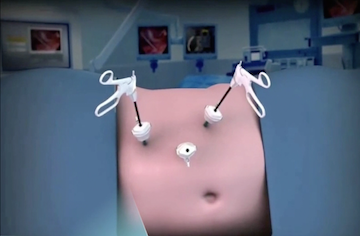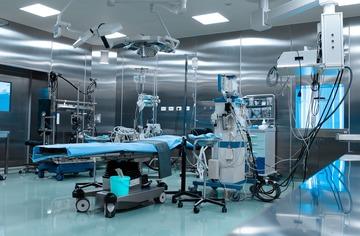Prostate Cancer treatment
Treatment of prostate cancer is a task for a whole team of specialists: urologists, surgeons, oncologists, chemotherapy specialists and radiologists. There are many options for treating prostate cancer and these include surgery, brachytherapy, hormonal treatment, target treatment, chemotherapy and radiation treatment. For every case we choose the course of treatment depending on a number of factors specific to the patient.

Diagnosis and treatment of all patients with prostate cancer is carried out under the leadership of the clinical and medical science centre for oncology and urology Dr. Oganes Dilanyan (PhD Med.). Every patient has a tailored treatment plan taking into account such factors as stage of disease, patient’s wishes and the state of their general health.
Предлагаемое лечение
Doctor’s consultation
During the first visit a conversation with the patient takes place as well as the expert assessment of the tests and investigations they have been subject to. Patient is also referred for all the necessary additional tests and all the paperwork for the board of oncologists meeting is prepared.
Complete diagnosis
If the PSA is raised, a prostate biopsy will be required. We prepare the patient for biopsy in 1 day. After 2 or 3 days if cancer is detected by the test we perform the MRI and CT scan of the pelvic organs in order to rule out metastasis.
Please note! If the biopsy, CT scan or MRI have already been carried out the board of doctors meeting will be scheduled for day 2.
Board of Oncologists council (meeting)
All of the patient’s data are presented to the board of doctors and they discuss the stage of the cancer, patient’s age and their wishes as well as underlying conditions. Risk assessment and assessment of potential effectiveness of available treatment methods for this particular patient is then carried out.
Individual Treatment Plan
An individual plan of treatment is worked out for the patient. Included in the plan are the board of oncologists’ recommendations as well as the description of the procedures in preparation for prostate cancer surgery, brachytherapy, chemotherapy or radiotherapy.
Please note! If all the tests and investigations have been carried out before the initial consultation the treatment plan is ready on day 2.
Treatment is commenced within a week
The length of treatment depends directly on the way of treatment chosen. For example if the patient requires surgery the fast track surgery methods that we use allow us to discharge the patient on day 7. Hormonal treatment, chemotherapy and radiotherapy require from 6 to 24 weeks as an outpatient
All stages of treatment are controlled by our team of oncologists.
Follow up and treatment adjustment
The success of the treatment for prostate cancer and patient’s life expectancy depends directly on the correctly carried out follow up. We always provide follow up to our patients for the period of 5 years together with additional tests over this period. The oncology tem allows us to control the condition even in cases of relapse.
Prostate cancer diagnosis
Correct diagnosis is the first step to getting the correct treatment. In case of prostate cancer it is paramount to determine the stage of the cancer and determine if the tumour is limited to the prostate of has metastasised and what treatment option would be most effective and have minimal side effects and complications. We have everything we need in order to do just that at the Moscow centre for Innovative Urology.
Our goal is to determine the best course of treatment for every given patient.
Raised PSA
- When a patient comes to us with raised PSA we always determine their prostate health index which is based on various blood test results. *This test helps us to avoid performing a prostate biopsy.
- If the index points to an increased risk of prostate cancer we offer a precise prostate biopsy. Our anatomical service provides a double controlled result in 3 days.
- When malignant cells are present we commence immediate diagnostic process aimed at determining how far the tumour has spread. After that the team of doctors are called to a meeting to determine the individual treatment plan.
Cancer confirmed by biopsy
- When a patient comes to us with diagnosed prostate cancer we perform an MRI scan of the prostate and pelvic lymph nodes as well as a lung CT scan to rule out metastasis. In some cases we carry out a bone scan, which allows us to assess the spread of cancer to the bones.
- To assess the effectiveness of further treatment we carry out thorough checks of the cardiovascular system and blood clotting, and assess the risks of surgery as well as risks of hormonal treatment and chemo- and radiotherapy.
- Once we have all the test results we discuss the patient’s diagnosis with the board of doctors and carry out an assessment of risks and effectiveness for each possible treatment and.
Personalised medicine is the best way to fight serious cancers. Being a reference clinic for treatment of prostate cancer and adhering to Swiss standards of diagnosis and treatment, Moscow centre for innovative urology applies personalised health care principles to each and every patient.
After all the necessary diagnostic tests have been carried out we present the patient’s details to the board of oncologists and get the opinions of an oncology/urology specialist surgeon, radiotherapy specialist and an oncologist specialising in chemotherapy. Every treatment option is evaluated in terms of maximum safety and maximum effectiveness and the stage of the cancer, patient’s age and of course their wishes are all taken into consideration.
Our recommendations on the types of treatment for prostate cancer in our clinic are based on international clinical recommendations of European Association of Urology and European Association of Oncology
The individual treatment plan for any given patient depends on many different factors. And the most important question to answer first is whether the tumour is localised in the prostate or has it spread to the lymph nodes, bones and lungs. The second but equally important question is the patient’s potential tolerance of certain treatments. When carrying out test on a patient we always answer those questions and during our board of doctors meeting we settle on the safest and most effective way of treatment.
Localised Prostate Cancer
Surgery is “the gold standard” of treatment in the cases when the tumour has not spread beyond the prostate.
- We practice laparoscopic prostatectomy which allows us to avoid a large incision, post-operative pain and inflammation.
- In most cases we preserve neurovascular bundles thus preventing incontinence and erectile dysfunction after surgery.
- When it is not possible to operate due to underlying conditions or patient’s unwillingness to undergo surgery another method of treatment will be selected.
Metastatic Prostate Cancer
If cancer is already advanced and has reached 3rd or 4th stage we apply focused external radiotherapy, chemotherapy and hormonal treatment. The combination and sequence of treatment options used is determined by the board of doctors.
- In the presence of bone metastases chemotherapy is used, “pumping” calcium into the areas of metastases.
- Hormonal therapy is used in different modes depending on the patient’s general health.
- Modern target therapy and chemotherapy (in most cases as daytime outpatients) allows us to systematically fight prostate cancer.
Our main advantage is the interdisciplinary approach we use. We never suggest surgery only, chemotherapy only or radiotherapy only treatment. It is clear that for a clinically obese patient or a patient with multiple underlying conditions any surgery, be it laparoscopic or open surgery is not advised. For this patient the best treatment would be perineal prostatectomy, high-dose rate brachytherapy with external radiotherapy or hormonal treatment.
THE PATIENT’S OPINION WHEN CHOOSING THE TREATMENT METHOD IS OF PARAMOUNT IMPORTANCE
Our board of doctors’ recommendations are based on giving our patients a choice. We explain all the risks and possible side effects of all treatments available and give recommendations. The decision is always up to the patient.
Laparoscopic prostate cancer surgery – is “the gold standard” of surgical treatment. In cases with localised prostate tumour we always offer this option as apart from removing the prostate this method gives us the opportunity to preserve neurovascular bundles and ensure the patient does not suffer from incontinence and erectile dysfunction after surgery.
Advantages of laparoscopic prostatectomy
Преимущества лапароскопической простатэктомии
Unlike the standard open surgery laparoscopic surgery for prostate cancer takes the lead for its effectiveness, minimal blood loss and preserving the neurovascular bundles. In the leading European clinics this method is currently considered to be the gold standard.
Modern laparoscopy in our clinic is 3D video which allows high precision removal of lymph nodes and prostate, while 10 fold magnification of operating area together with ultrasound scalpel allow us to avoid significant blood loss.
A very important aspect of laparoscopic surgery is the ability to preserve the neurovascular bundles of the prostate. This ensures the patient does not suffer from urinary incontinence and erectile dysfunction. We also use the latest available surgical sutures which help to avoid urethral stenosis.
Absence of open cut means no pain, inflammation or ugly scarring. This is why laparoscopic surgery is so popular. Not a single patient requires pain relief after surgery.
The main goal of any modern medical facility is minimising the risks associated with surgery. Laparoscopic surgery ensures minimal blood loss, lack of inflammation and scarring as well is avoiding the risk of developing a post-operative hernia.
After open surgery the patient usually stays in hospital for 2 weeks and adheres to some restrictions up to a year following the surgery whereby the patient is not allowed to lift heavy loads or do sports. After laparoscopic surgery the patient leaves the hospital after 5-7 days with no detrimental effects to quality of life.
Professional Approach: up to date cancer treatment according to recommendations of European Urological and Oncology Associations.
Our team: Specialised science-based team of urologists specialising in oncology. All our doctors are certified oncologists.
Board of Doctors: In depth discussion of every case with an oncologist, radiologist and chemotherapy specialist to ensure the correct treatment option is chosen.
Equipment: Latest generation surgical equipment manufactured in Germany and Japan.
Comfort: no queueing or waiting for a consultation, premium impatient facility with advanced nursing care.
Safety: Use of EAU and AAU approved methods.
Result: precise diagnosis, effective treatment and dynamic follow up.
And also Our Good Clinical Practice certification confirms the highest standards of diagnosis and treatment.




